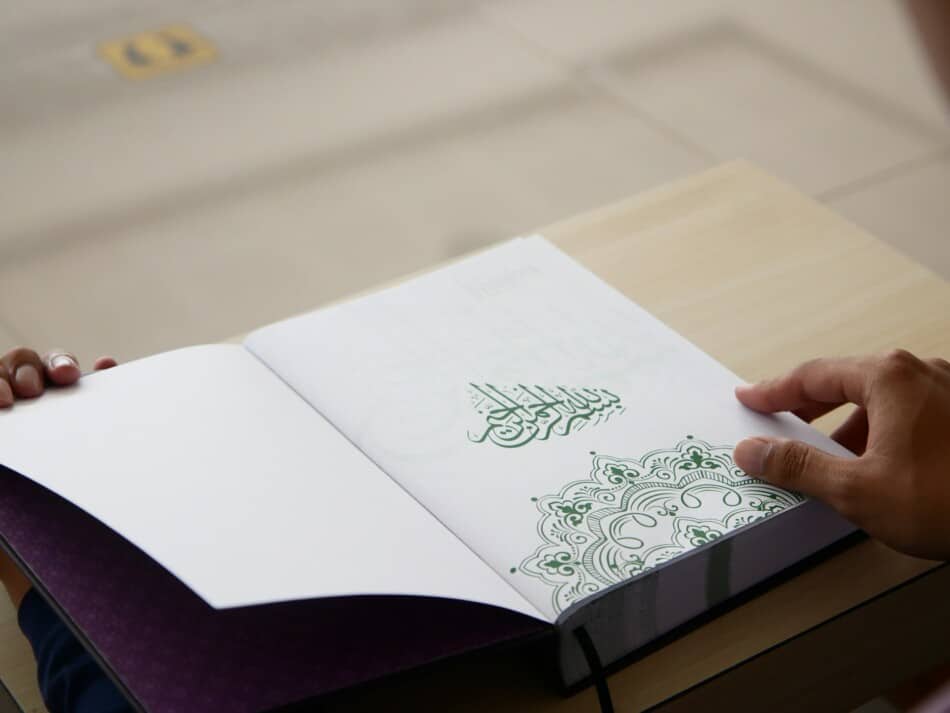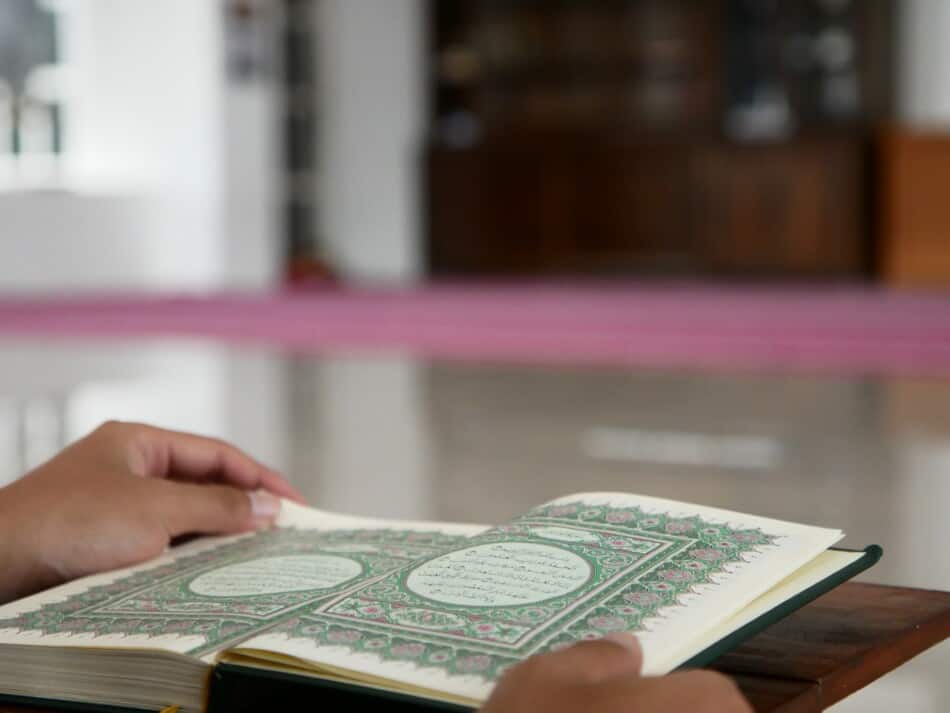Whether you have recently converted to Islam or are merely interested in different cultures, works of literature, and religions, learning the Quran is an immensely important yet difficult feat.
It requires discipline, determination, and a lot of time and effort. Furthermore, if you’re unfamiliar with Classical Arabic, you have a whole other milestone to cross first!
Learning the Quran is immensely rewarding, though, as long as your intentions are pure and just.
If you intend to learn more about God, your purpose here on earth and have more guidance as to how you should live your life, you are on the right track, and it will make the challenge of learning the
Quran much easier. Once you have the right motivations, the work should come to you naturally!
What Do You Need To Gather Before Studying The Quran?
When learning the Quran on your own, you will want to prepare two sets of resources before setting out on this spiritual and intellectual journey.
Firstly, you must prepare materials to help you learn and understand Quranic or Classical Arabic; secondly, you must obtain a physical or online copy of the Quran and its companion scripts.
-> Read Also What Is An Autodidact?
What Should You Prepare To Teach Yourself Quranic Arabic?

The internet is a goldmine of scholarly resources. Every day, people work to teach themselves a language from resources found on the internet exclusively.
The Muslim community is always eager to have new learners of Arabic and Quranic Arabic, and as such, many of these resources are completely free to use.
To learn Quranic Arabic, you will need a couple of different resources.
As language learning is a multi-faceted practice, you will need resources that train you in each aspect of the language – from learning the scripts to teaching you vocabulary and understanding grammar enough to make sense of different sentences.
Because of the multi-faceted requirements of learning any language, the resources we recommend are a combination of various media.
They will consist of textbooks, apps, podcasts, dictionaries, and more. Hopefully, they will make your journey more painless.
Here are some of the most helpful resources that are sure to aid you in learning Quranic Arabic:
- The Madinah Arabic course is an online resource that contains everything you need to start learning Arabic. It has lessons starting with the scripts and continuing to the most complex grammar. You can practice with their various quizzes and even connect with online teachers.
- Anki is a powerful flashcard app that will surely come in handy if you enjoy that learning style. Flashcards will likely be most effective when used to memorize the Arabic script and vocabulary.
- The Medinah Books and coursework set up by LQ Toronto grant learners free access to multiple digital textbooks, video lessons, and summarized handouts that will come in handy along your language learning journey. These are free if you don’t use them for commercial purposes.
- If you prefer physical copies of textbooks to work through, consider buying a book such as the Fundamentals of Classical Arabic by Husain Abdul Sattar. Search for your preferred book and compare the benefits to the cost of each option. Your local mosque may also have some on hand.
What Should You Prepare To Study The Quran?

To learn and recite the Quran, you will naturally need a copy of the Quran written in Classical Arabic. Optionally, you can also get one written in your native language. Furthermore, having a dictionary or dictionary app on hand would be useful.
Here are a couple of recommended Quranic resources:
- The Qur’an (Oxford World’s Classics) was translated to English by M.A.S. Abdel Haleem. This copy is one of the most reputable English translations of the Quran. We recommend this for someone more interested in simply learning about the Quran or who wants to aid their learning of the Quran.
- The Corpus Quran Dictionary is an online dictionary specifically designed for words found in the Quran. There are additional tools and resources as well, such as a treebank.
- Quran.com is a super handy and interactive online Quran, available in many different languages, including Quranic Arabic. Consider downloading an iOS or Android Quran app. These are also interactive, allowing you to tap on a word and get an instant translation.
- Buy a physical copy of an Arabic Quran online or at your nearest mosque. In addition to your online and digital resources, having a Quran by your bedside will aid in reading at least a verse daily, especially before going to bed or when waking up.
Now that we’ve skimmed through everything you need to prepare, we can start learning the Quran. The first couple of steps will focus on learning Quranic Arabic, while the following steps will revolve around reciting and memorizing key parts of the Quran.
-> Learn more about the 7 best websites for self-learning
1. Familiarize Yourself With The Quranic Arabic Script
First and foremost, before starting to read the Quran, it is rather important to learn how to read and understand Quranic Arabic.
Learning the Quran in Arabic is optional and highly dependent on your motivation to learn the Quran. If you are merely doing it for interest’s sake or research, it is fine to do it in your native language.
If you plan on devoting yourself to Allah, starting in your native language is fine, but reading the Quran in Arabic will allow you to get closer to the intended meaning of verses and hence closer to Allah.
When you pray in congregation, it will likely be in Quranic Arabic. Furthermore, revering to and hearing the Quran in Arabic will likely make you feel more comfortable.
Therefore, we recommend starting to learn the Quran by learning Quranic Arabic. Luckily, the two are interdependent; once you start with one, the other will easily come to you.
The first step in learning any language would be learning the target language’s script or alphabet.
For learners more used to the roman alphabet, this may prove to be a challenge, but it may also be a lot of fun.
Use mnemonics (pictorial aids) to help you remember the shapes of the different Arabic letters and print out charts containing the different letters and their respective pronunciations.
The Al Qaem Channel on YouTube provides super handy English lessons regarding how the Arabic script works.
These lessons are split into three one-hour sessions and cover nearly everything you need to know to recognize, read, and pronounce the different symbols. From there, all you have to do is practice and practice some more.
2. Practice Reading, Writing, And Pronouncing Arabic
Step two ties into the first, but this one demands more brain power. Familiarizing yourself with Arabic script is one thing; however, learning how to use it effectively is entirely different.
First, take online quizzes to ensure you know what sound is attributed to what “letter.”
When you are sure you can differentiate the Arabic letters from one another, start reading Arabic texts. Why not start with the Quran since it’s the reason for this whole exercise?
At first, you will likely stutter a lot, and that’s fine. Start slow and get more comfortable reading in an unfamiliar script.
If you’ve become more comfortable reading in Arabic, try to pronounce the words out loud. Once again, even when you stutter, keep going! Nobody could ever read fluently from day one.
If you don’t get it right, try again and read the sentence from the start until you get it right – your mind usually remembers mistakes well, solidifying them in your memory.
Finally, try to write sentences therein to make yourself even more comfortable with the Arabic script.
Start by writing the Arabic alphabet over and over again, and once you are confident in your strokes, try to write verses out of the Quran on paper.
3. Learn How Quranic Arabic Grammar Works
With some languages, it is often recommended to get to know some starter vocabulary before starting with grammar. In Arabic, however, vocabulary and conjugations are highly dependent on the grammatical aspects of the language.
Therefore, doing some online coursework, using a textbook of your choice, and running through their curriculum is necessary.
Test yourself using the exercises in the textbooks or those found online, such as on the Madinah Arabic course online.
4. Memorize A List Of Arabic Vocabulary
Once you’ve finished studying the grammar, start memorizing vocabulary – especially the words most often used in the Quran. We recommend using the Anki app that you can download on your computer and phone. Here is an Anki flashcard deck containing some of the most common words in the Quran.
Another Anki deck has some similarities to the one mentioned above, with the bonus of audio voiceovers to each flashcard.
This audible aid will help solidify your listening and pronunciation skills. You can also opt for creating your own Anki deck – then, you can add words to the list each time you spot something new while reading the Quran.

5. Read The Quran Silently And Translate It On Paper
After you’ve learned enough vocabulary and grammar and are completely comfortable with the Arabic script, you can finally start reading the Quran in Classical Arabic! Read the Holy Script out of your favorite physical copy, or opt for reading it online.
If you’re still unfamiliar with Quranic Arabic, we recommend reading it alongside an online version in your native language.
This way, you can compare your understanding of the verses in Quranic Arabic to the translation and see how close you got to the true meaning.
You can go the extra mile and write out the verses you’re reading on paper. First, write it in Quranic Arabic, then in your understanding of the verse.
Finally, compare it to the right verse translation and correct your mistakes. Ideally, you should also find online resources of experts explaining the deeper meaning behind the verses which the language implies.
6. Listen To The Quran In Arabic
There are various ways to listen to the Quran in Arabic. Most accessible would likely be on YouTube or other streaming platforms of your choice, such as Spotify or Apple Music.
However, other websites and resources provide the same service, so look around for something that fits your needs best.
The benefits of listening to the Quran in Arabic are endless:
- It will train your Classical Arabic ability in terms of listening ability and understanding speech.
- It will help you get closer to Allah by listening to someone recite verses and prayers for you.
- When you go back to reading those same passages, you will likely have an easier time pronouncing and reciting them.
Reading along in your own Quran while you listen to your favorite reciter is also recommended. Practicing like this will primarily ensure that you focus on what is being said and help you read and listen more clearly (almost like watching a movie with subtitles).

7. Get Into A Rhythm Of Reciting Quranic Verses Daily
Set a goal of how many verses you want to recite daily. You can set your daily goal to any number and rule of your choice.
You could, for instance, aim to recite one verse on the first day, then on day two, you recite the same verse as yesterday, with a new one added.
On day three, you can add another additional verse while keeping the two previous verses part of the mix.
You can choose to recite verses in a completely different manner as well. Maybe you still want to find your favorite verses, and as such, you would rather choose to do three unique verses per day.
Regardless of your choice, try and stick with your original goal and stay consistent with your work.
Reciting daily Quranic verses will help you memorize the Quran while bringing you closer to Allah’s word. Stay in this rhythm and increase the difficulty of your goals once you feel comfortable with it.
Many Muslims also recommend reciting verses melodic, which will help with memorization since it pleases the ear.
8. Start Memorizing Parts Of The Quran
The Quran consists of 6,236 verses which are split into 30 chapters. Memorizing the Quran is by no means an easy task.
Doing so, however, will undoubtedly mean a lot for you as a Muslim and increase your understanding of the world and life, for there is a lot of wisdom concentrated in the Holy Quran.
Memorizing the Quran will prove your faith and make you a strong, steadfast, and determined follower of Allah. One is sure to get distracted along the way, but if you can stay at it long enough, you can improve your focus in all facets of life.
Furthermore, if you would like to join a congregation and pray among your brothers someday, having a strong knowledge of the Quran will certainly count in your favor.
You will more easily remember the different prayers and start remembering verses throughout your day to help guide your living.

9. When Memorizing, Do The Shorter Surahs First
It’s impossible to memorize an entire Surah in one sitting. Memorizing small parts and verses, however, is much more manageable.
When you start memorizing small parts and putting them together, you can get closer and closer to memorizing an entire Surah.
Therefore, start with a smaller Surah to see measurable progress. As you become more skilled, try learning increasingly longer Surahs.
10. Join The Congregational Prayer At Your Local Mosque
Humans are naturally social creatures, so social learning is immensely valuable. Although this article mainly focuses on learning the Quran on your own, learning amongst others should be seen as an additional step to help fortify your understanding of the Quran.
Furthermore, taking this leap is best when you already have a solid knowledge of the Quran.
Praying amongst other Muslims will create a sense of community and comradeship like no other. Go to your local mosque and join the congregational prayers on Fridays.
Your recitation will now be tested as you have to do it as a group. It will also help your memorization of the Quran by giving you more exposure.
-> Learn More about Self-Learning vs. Classroom Learning: Which Is Better?
Conclusion
Learning the Quran on your own will help pave your way to understanding Allah’s word and will be considered an act of merit by Muslims and scholars around you.
Patience and hard work will be necessary, but the rewards will present themselves to you within the sacred text.
Therefore, persevere and take time to slowly recite your prayers, and soon the job will seem easy enough.






